
Select Page
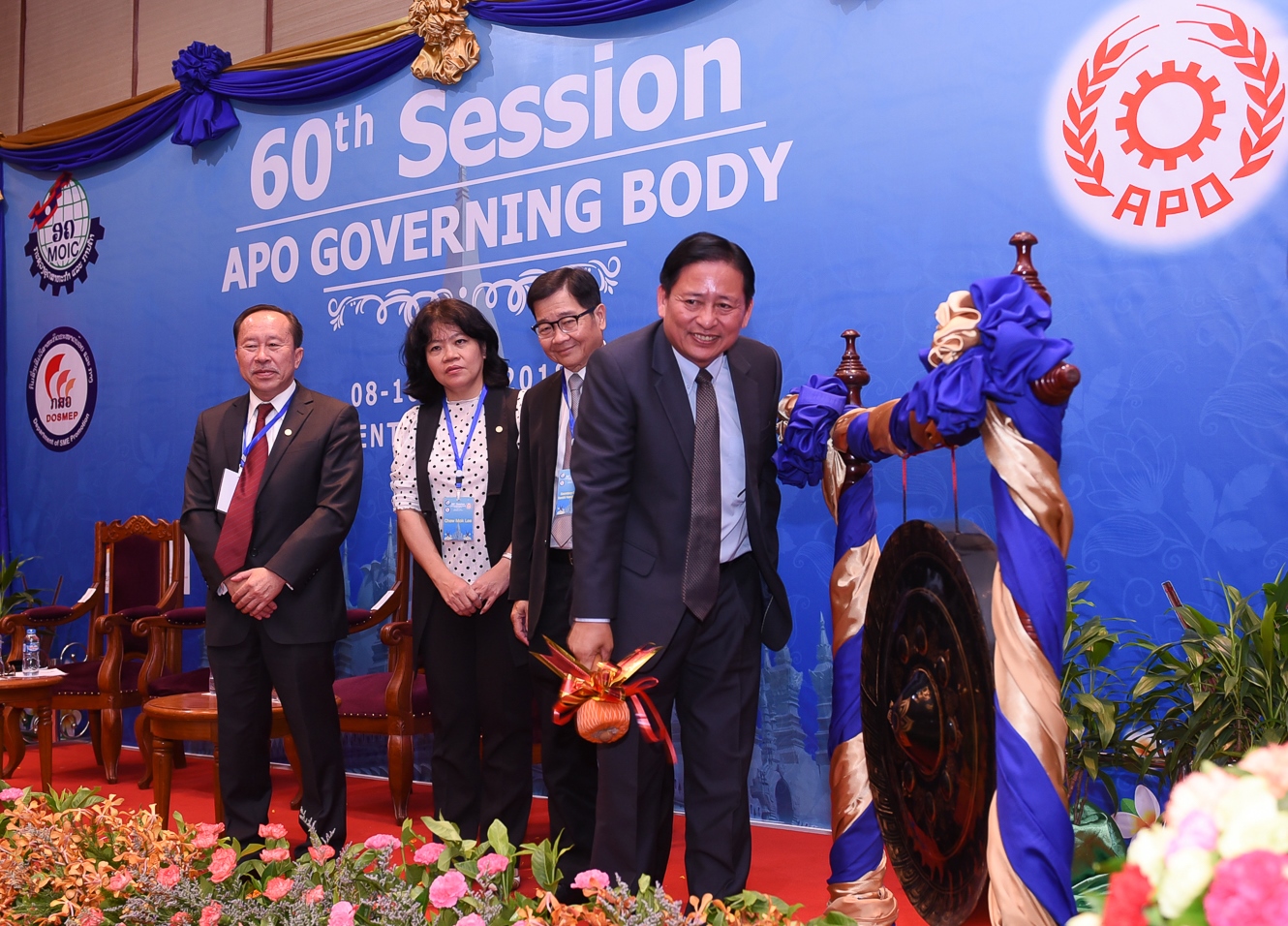
Deputy Minister of Industry and Commerce Somchith Inthamith of Lao PDR beating the gong to formally inaugurate the 60th session of the Governing Body in Vientiane, Lao PDR, 8 May 2018.
The Asian Productivity Organization (APO) concluded the 60th session of the Governing Body (GBM) in Vientiane, Lao PDR. Held 8–10 May 2018, the GBM, as the supreme decision-making body, was attended by representatives and advisers from 18 APO member countries and observers from the Asian Development Bank, Deutsche Gesellschaft für Internationale Zusammenarbeit, and Pan African Productivity Association. The guest of honor at the inaugural ceremony was Deputy Minister of Industry and Commerce Somchith Inthamith of Lao PDR.
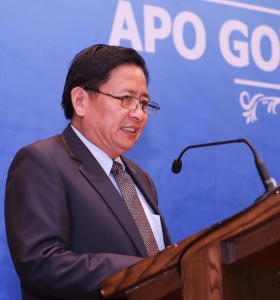
Deputy Minister of Industry and Commerce Somchith Inthamith of Lao PDR delivering the inaugural address.
In his inaugural address, Deputy Minister Somchith noted that the APO would celebrate its 57th anniversary in a few days’ time and had contributed significantly to the development of its members in the last six decades. With rapidly changing regional and international contexts, Deputy Minister Somchith suggested that APO support and assistance should focus on creating an ecosystem for integrating SMEs and micro SMEs (MSMEs) into regional and global value chains.
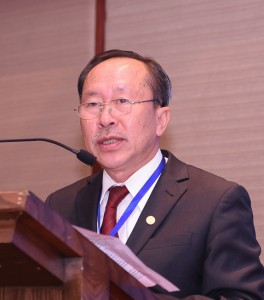
APO Director for Lao PDR Somdy Inmyxai giving the welcome address.
In welcoming GBM delegates, APO Director for Lao PDR Somdy Inmyxai said that the country was honored to host the 60th Session of the Governing Body for the first time since becoming a member in 2002. “This demonstrated the strong, continuous commitment to work with the APO, which has been providing support and assistance to the country’s productivity initiatives,” he declared, adding that the APO had helped Laotian SMEs raise productivity and efficiency through participation in demonstration projects, seminars, and training courses.
Outgoing APO Chair Chew Mok Lee thanked Lao PDR for hosting the GBM. She said that the APO had made significant contributions to socioeconomic development in the Asia-Pacific region since its inception in 1961 and hoped that member economies would continue to grow and achieve Vision 2020. Recognizing that the strong spirit of cooperation among members was the key success factor in resolving issues, the Chair also expressed confidence in the leadership of the Secretary-General and commitment of member countries as well as the APO ecosystem and networks.
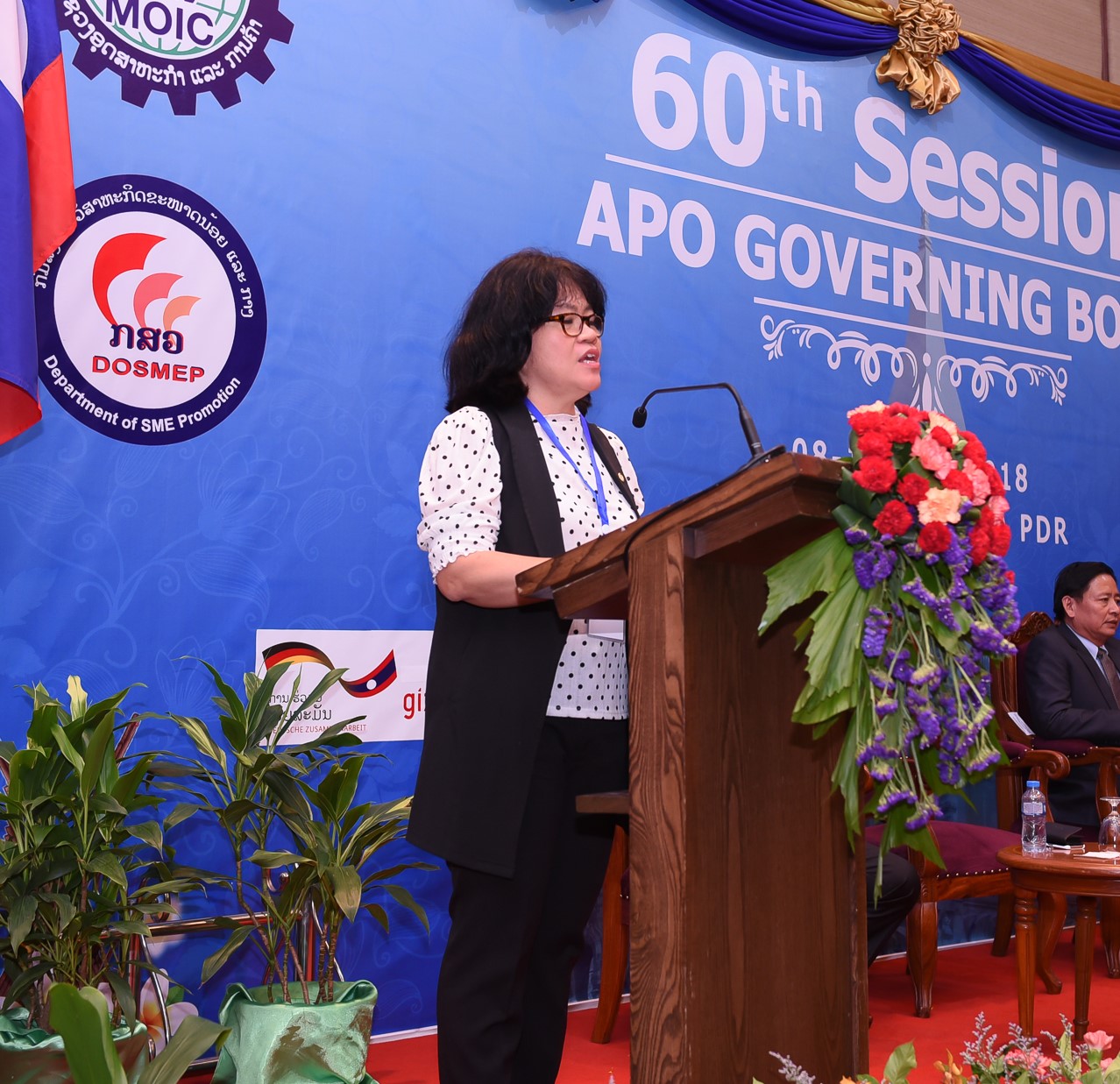
APO Director for Singapore Chew Mok Lee presenting opening address.
The inaugural session of the GBM concluded with the conferring of Certificates of Recognition on Singapore, the Republic of China (ROC), the Philippines, and India for their contributions to improving productivity in member countries by setting up APO Centers of Excellence (COE). The APO COE Program allows the best practices of an NPO in a specialized area to be emulated by others. Each COE shares its knowledge and methods through training, workshops, and study missions.
During the plenary session, APO Director for Sri Lanka Javigodage Jayadewa Rathnasiri was elected APO Chair for 2018–19, while APO Director for Thailand Pasu Loharjun and Acting APO Director for Vietnam Nguyen Hoang Linh were elected First Vice Chair and Second Vice Chair, respectively. Important GBM agenda items included the Annual Report of the Secretary-General, approval of the Financial Report for the Year 2017, Report of the 56th Workshop Meeting of Heads of NPOs to the Governing Body, and APO Preliminary Budget for the 2019–2020 Biennium. APO Directors considered and reviewed the Roadmap to Achieve the APO Vision 2020 and unanimously approved the Report on the Performance of APO Centers of Excellence.
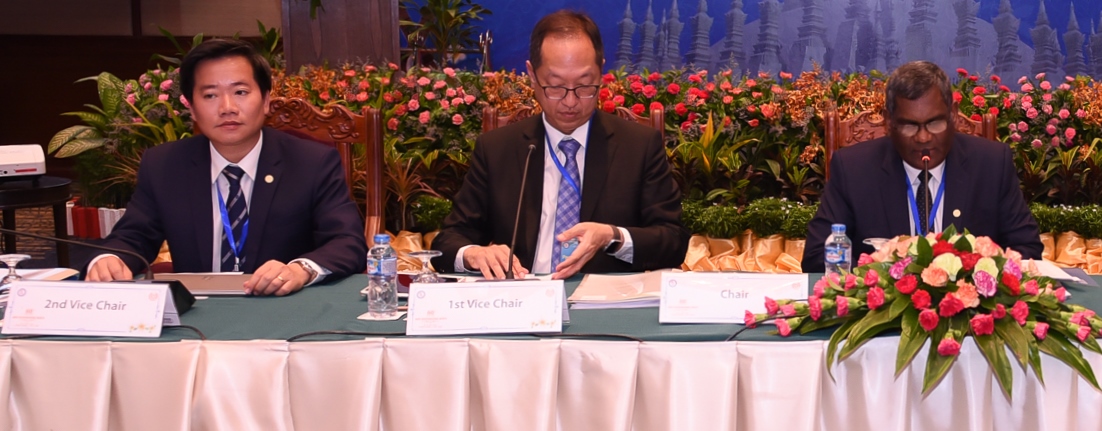
APO Chair and Vice Chairs for 2018–2019: (L-R) 2nd Vice Chair Nguyen Hoang Linh, 1st Vice Chair Pasu Loharjun, and APO Chair Javigodage Jayadewa Rathnasiri.
APO Directors made presentations on key challenges facing their countries to improve productivity through innovation; national economic policies related to innovation that helped promote productivity improvement, and the type of government support provided to NPOs to help fulfill their missions. The final day of the meeting was marked by the handing-over ceremony of the GBM pennant. On behalf of 2018 host Lao PDR, APO Director Somdy presented the pennant to the APO Director for the Philippines Adoracion M. Navarro, as his country will host the 61st GBM.
Presenting the vote of thanks, APO Director for Mongolia Yamaaranz Erkhembayar expressed appreciation to the Government of Lao PDR for hosting the meeting as well as the country’s APO Director Somdy for his leadership and guidance in making the meeting successful. Erkhembayar also thanked the outgoing APO Chair Chew Mok Lee, who presided over the Inaugural Session and the preparatory meeting.
Delivering the closing statement, APO Secretary-General Dr. Santhi thanked all Directors and delegates for their cooperation in making the GBM successful. He stated that the Secretariat would look forward to feedback from member countries on the Roadmap to Achieve the APO Vision 2020 and discussion of it at the Strategic Planning Workshop (SPW) in July. He pledged that the Secretariat would refine approaches to address emerging challenges in achieving the goals of the vision through that consultative process.
In his closing remarks, APO Chair and APO Director for Sri Lanka Rathnasiri said that the GBM had concluded on a fruitful note and arrived at most decisions amicably. He described the APO as “the spearhead of all NPOs” and felt that its role “to enable, empower, and pioneer new initiatives” could not be understated.
Annual Report by the Secretary-General
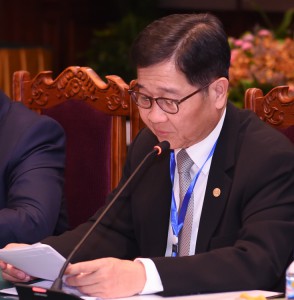
APO Secretary-General Dr. Santhi Kanokutanaporn presenting the APO’s achievements in 2017.
Welcoming APO Directors, advisers, and observers to the GBM, APO Secretary-General Dr. Santhi Kanoktanaporn said that since member economies were facing similar disruptions caused by the unprecedented speed, breadth, and depth of the new waves of digital technologies, he had held several discussions with NPOs on how the APO needed to transform to stay relevant to them.
The Secretary-General reported that the Secretariat had reviewed the Roadmap to Achieve the APO Vision 2020 since it and related strategies should evolve along with the global environment and explicitly recognize possible areas for improvement. He also said that the Secretariat had hired Accenture to assist in reviewing the roadmap and focus on external trends and new technologies changing the economic landscape.
“The time has come for a new model of member country engagement, one that strengthens and deepens communication among member governments, NPOs, the Secretariat, and the sectors we want to make more productive. Member country engagement has been for too long focused on structured annual meetings. If engagement is to be meaningful and productive, it needs to be a year-round conversation about improving the value of the APO to key stakeholders,” he stated.
The Secretary-General also summarized initiatives taken up by the Secretariat in 2017. They included the SPW held between the GBM and Workshop Meeting of Heads of NPOs to involve national strategic planners on a more informal basis. He noted that the Secretariat had organized a Strategic Foresight Workshop involving a group of APO Directors and NPO Heads to kick off the program to help member countries build capabilities in foresight, which was critical to shaping future-ready national policies.
“Given the volatile and complex environment that member countries face, the APO launched its Strategic Future Platform to build foresight and scenario-planning capabilities in member countries to navigate the uncertain global environment and sustain productivity growth. The APO also unveiled the eAPO, which marked a new phase in e-learning to provide professionals with state-of-the-art productivity knowledge on a mobile-learning platform,” the Secretary-General said.
In concluding, Secretary-General Dr. Santhi expressed deep gratitude to member countries for their support and for the flexibility, understanding, and cooperation extended to him. He also thanked the Governments of Japan and the ROC for providing special cash grants enabling the APO to implement additional programs on top of those funded by membership contributions.
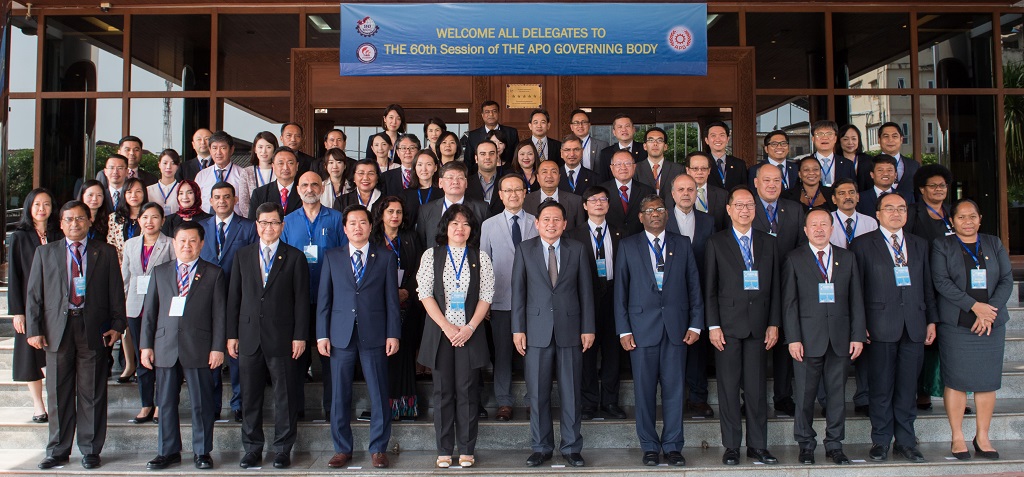
60th GBM delegates.
Photos: LNPO
Inaugural address by Deputy Minister of Industry and Commerce of Lao PDR Somchith Inthamith
Welcome remarks by APO Director for Lao PDR Somdy Inmyxai
Opening address by APO Chair Chew Mok Lee